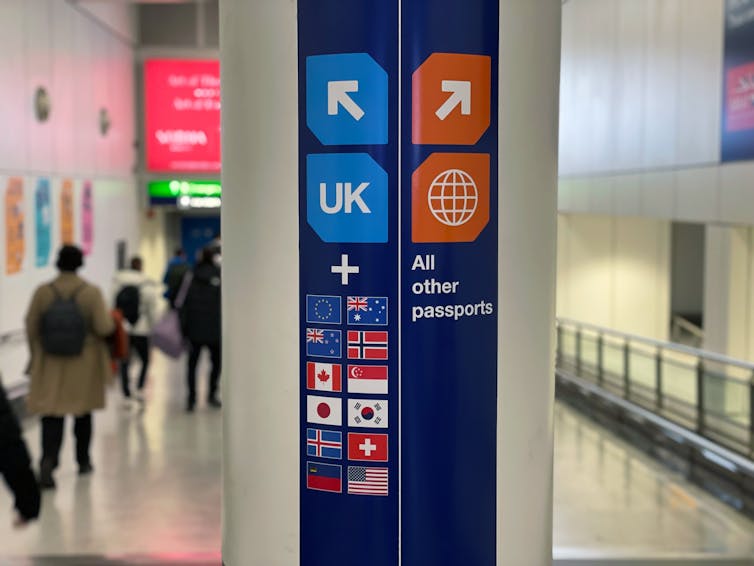Applying for a Schengen visa
The information on this page is indicative and not exhaustive. Interested parties should seek additional information from the Embassy or Consulate of the country of their main destination.

What is a Schengen visa?
A Schengen visa is an entry permit for a short, temporary visit of up to 90 days in any 180-day period. A Schengen visa can be obtained in the form of a single-entry visa , allowing the holder to enter the Schengen area once, or a multiple-entry visa , which is granted for several visits to the Schengen area for as long as it is valid.
The short-stay visa calculator can be used to calculate the remaining period of allowed stay. The user's guide will help you navigate the calculator with step by step instructions and practical examples.
An airport transit visa allows its holder to connect through the international transit area of an airport in the Schengen area during a stopover or a change of flights. This visa does not allow its holder to leave the international transit area of an airport.
Who needs to apply for a Schengen visa?
Certain non-EU citizens must hold a short stay visa when traveling to the Schengen area. The EU has a common list of countries whose citizens are required to hold a visa when crossing its external borders. There are national derogations from the visa requirements for certain travellers.
Some third-country nationals must also hold an airport transit visa when connecting through the international transit areas of airports located in any of the Schengen States . For citizens of certain additional countries, an airport transit visa is required when connecting through the international transit areas of airports located in some of the Schengen States . There are some categories of persons who are exempt from the requirement to hold an airport transit visa (see Article 3(5) of the Visa Code ).
Where to apply?
You must lodge the application for a Schengen visa at the Consulate of the country you intend to visit . If you intend to visit more than one Schengen States, you should apply at the Consulate of the country where you will spend the longest period of time.
If you intend to visit several Schengen States and the stays will be of equal length, you must apply at the Consulate of the first country you will visit.
As a general rule, you must apply for a Schengen visa at the Consulate with territorial competence for the country in which you legally reside.
More information for each Schengen country can be found on dedicated websites
When to apply.
The application must be submitted to the Consulate at least 15 days before the intended journey and cannot be lodged earlier than six months prior to the start of the intended journey. You may have to book an appointment before lodging the application.
What documents are needed to apply?
- A valid passport. The passport’s expiry date should be at least 3 months after the date of your departure from the Schengen area. In the case of multiple-entry visa, the passport’s expiry date should be at least 3 months after your departure from the last country visited.
- A visa application form .
- A photo in compliance with ICAO standards .
- Medical insurance covering emergency medical, hospitalisation and repatriation (including in case of death).
- Supporting documents relating to the purpose of your stay, evidence of financial means during your stay, your accommodation and your will to return to your home country after your stay.
- Your fingerprints will be collected when you submit your application (exemptions exist for specific categories of applicants).
- Additional documents can be requested by the Consulates.
How much does a visa cost?
- 80€ for adults;
- 40€ for children aged 6-12;
- 35€ for applicants from Armenia, Azerbaijan, and Belarus;
- 60€ for applicants from Cabo Verde.
An additional fee may apply if you go through visa service centres , which collect applications on behalf of Consulates in some cases.
The visa fee can be waived for specific categories of applicants.
Processing time of the application
The normal processing time of a visa application is 15 days. This period may be extended to up to 45 days, if a more detailed examination of the application and/or additional documents are required.
Under certain conditions, family members of EU or EEA citizens falling under the Free Movement Directive are eligible for a free and accelerated visa procedure.
Refusal of a visa application
The decision to refuse a Schengen visa and the reasons for the refusal are transmitted to the applicant using a standard form. The decision to refuse the issuance of a visa includes the reasons on which the refusal was based, and the procedures and deadlines for submitting an appeal.
Share this page
Awesome, you're subscribed!
Thanks for subscribing! Look out for your first newsletter in your inbox soon!
The best things in life are free.
Sign up for our email to enjoy your city without spending a thing (as well as some options when you’re feeling flush).
Déjà vu! We already have this email. Try another?
By entering your email address you agree to our Terms of Use and Privacy Policy and consent to receive emails from Time Out about news, events, offers and partner promotions.
Love the mag?
Our newsletter hand-delivers the best bits to your inbox. Sign up to unlock our digital magazines and also receive the latest news, events, offers and partner promotions.
- Things to Do
- Food & Drink
- Arts & Culture
- Coca-Cola Foodmarks
- Los Angeles
Get us in your inbox
🙌 Awesome, you're subscribed!

Everything you need to know about travel to Europe after Brexit
Do you need a visa to travel to the EU after Brexit? Here’s how the rules are looking in 2024

Way back in 2020, the UK left the EU and Brexit took effect. Since then, a hell of a lot has changed about how we travel. There’s now plenty of extra stuff to think about when planning a trip overseas to Europe (especially if it’s for longer periods). So, we ’ve rounded up all the changes to the rules that we’ll have to follow, now that we’re no longer EU citizens. Here is everything you need to know.
RECOMMENDED: 🌤️The best city breaks in Europe for 2024 🏩The best hotels in Europe 🚄The best European sleeper trains launching in 2024 🏂The best affordable ski resorts in Europe
You should probably check your passport
Up until January 2021, all UK citizens with a valid passport were able to travel freely throughout Europe. Now, though, you may need to renew your passport much earlier than you might think. On the day you travel, your passport must have at least six months left before it expires, or you might not be able to travel to any EU countries, or the EEA states of Iceland , Liechtenstein, Norway and Switzerland . (The old rules still apply for travel to Ireland.)
You can check if you need to renew your passport before travelling using this tool from the British government, and you can apply for a new one here . Make sure you renew it at least a couple of months before you’re planning to travel, as it may take several weeks to process applications in busy times (including right now).
You can no longer apply for an EHIC
Your European Health Insurance Card (EHIC) will remain valid until its expiry date, but you can no longer apply for a new one. In 2021, the UK government launched a replacement scheme, the Global Health Insurance Card (GHIC) , which will entitle you to necessary state healthcare for free or at reduced cost in Europe and other countries with reciprocal arrangements such as Australia and New Zealand . You can apply for one on the official GHIC website .
Free mobile roaming is a thing of the past
The guarantee of free mobile roaming throughout the EU, the Schengen area and the Norway, Iceland and Liechenstein, came to an end on December 31, 2020. It ’s best to c heck with your phone operator to find out about any charges you may incur in the country you’re travelling to.
Border checks may feel a little different
At border control, you will now need to use separate lanes from EU citizens when queuing. Officials may also be more inquisitive than before, asking you to provide a return or onward ticket and prove that you have enough money for the length of your initial stay.
Your driving licence will still be valid – but you’ll need a ‘green card’ proving you have insurance too
Despite reports British drivers would soon have to apply for an ‘international driving permit’ before travelling to the Continent, according to the terms of the Brexit deal, UK licences will still be valid within the EU.
According to this advice by the Foreign Office , you do not need a ‘green card’ (proving you have car insurance cover when driving abroad) when driving in the EU. However, countries where they do apply include Albania, Azerbijan, Moldova, Türkiye and Ukraine.
Welcome to the official ETIAS website
- ETIAS is currently not in operation and no applications are collected at this point.

The rules of travel to Europe have changed. Starting in the first half of 2025, some 1.4 billion people from over 60 visa-exempt countries are required to have a travel authorisation to enter most European countries.

Find out which European countries require an ETIAS travel authorisation, who needs to apply and who is exempt.

Learn about when to request an ETIAS travel authorisation with limited validity and what implications it has for your travel.

Find out what travel documents can be used to apply for an ETIAS travel authorisation. Learn about what information needs to be included in the application form and how much it costs to apply.

Learn how to authorise someone to apply for an ETIAS travel authorisation on your behalf and what to be careful about.

Find out how to appeal against a decision related to your ETIAS travel authorisation or data protection rights.

Be aware of possible abusive and fraudulent practices by commercial intermediaries and learn how to report them.

Find answers to the most common questions about ETIAS including how to apply, how much it costs and how long it will be valid for.

Find the latest updates and facts about ETIAS.
Share this page
- Skip to main content
- Keyboard shortcuts for audio player
Wait, do you need a visa to go to Europe now? The new ETIAS requirements, explained
Emily Olson

St. Mark's basilica in Venice is one place U.S. passport holders may not be able to get to without approval under the new ETIAS requirements Andrea Pattaro/AFP via Getty Images hide caption
St. Mark's basilica in Venice is one place U.S. passport holders may not be able to get to without approval under the new ETIAS requirements
Already thinking about next summer's vacation plans? If Europe is on your short list, there could be one extra step to take before boarding that plane.
Starting in 2024, American passport holders traveling to 30 European countries will need authorization via the European Travel Information and Authorization System (ETIAS).
Though it may sound complicated, the ETIAS and the reasoning behind it are quite similar to existing travel requirements and reflect increasing fear of terrorism in the U.S., Europe and around the world.
Here's what you need to know.
What is ETIAS? Is it a visa?
While some media outlets are taking a cue from the European Union's travel site and calling this a visa, in truth, ETIAS is more like a travel authorization form.

Summer air travel could be expensive and chaotic. Here's how to avoid trouble
"It's definitely not a visa," said Dan Hamilton, a senior non-resident fellow for foreign policy at the Brookings Institution. "It's an electronic entry-point, an authorization for countries that are currently visa-free."
Even the European Commission has said as much (and in bold letters) , writing this is "not a visa" but rather an "automated IT system" in a press release on the discussions around it back in 2018.
Whatever you want to call it, the ETIAS form is not what you'd seek if you're trying to work or live in Europe, but rather what you'll need for short-term trips — up to 90 days within any 180-day period.
Why is it being implemented?
These new requirements have been years in the making, stemming back to a rise in terrorism fears following 9/11. It's very similar to the Electronic System for Travel Authorization — or ESTA — program that the U.S. implemented in 2008 .
At the heart of ETIAS is an electronic database system to better track who's coming and going. According to the EU's latest report on terrorism data , EU law enforcement authorities arrested about 388 suspects for terror-related offenses in 2021, more than half of whom were accused of being associated with Jihadist groups based abroad.
The European Commission says ETIAS may have the added impact of cutting down on "irregular migration" (i.e. illegal immigration), but one thing the form is definitely not aimed to do is deter tourism in general.

'Revenge travel' is surging. Here's what you need to know
Crowded cities, inflated airfare and extreme heat disasters may all be making headlines this summer, but many of these European countries are still depending on tourism revenue to help them bounce back from pandemic slumps, Hamilton said.
And the pandemic is another one of the many reasons this new requirement has been delayed by decades — there was no need for ETIAS when countries closed their borders to all travel amid fears of spreading COVID-19.
"Another part of it is simply the pace of the way this parliament and European commission works," Hamilton explained in an interview with NPR. "They're ending their term and pushing through a lot of these directives because parliamentary elections happen next June."
"And getting 30 countries to agree on anything takes a long time," he added.
When does it take effect?
The European Union's website says the new authorization will start in 2024 but hasn't clarified a specific date. A press spokesperson for the union's travel arm did not respond to NPR's request for information.
And, similarly, a spokesperson for the State Department told NPR that the U.S. government website for international travel (travel.state.gov) would be updated "once the regulation goes into effect," but didn't specify when that would be.
"Frankly, I'd be surprised if this starts on time," Hamilton said. The rollout of ETIAS has already been delayed at least once.
But it couldn't hurt to plan ahead for any 2024 travel just to be safe.
Who needs to apply for ETIAS approval?
Basically, all passport holders from 60 countries who can currently travel to most European destinations without a visa — and that includes American passport holders — will now need to get ETIAS authorization for the same trip. That's about 1.4 billion people, by the European Union's estimation.
There are 30 European countries in total on the impacted destination list , including those in the "Schengen Area" — 27 European countries, many that are part of the European Union, that agreed to ease border restrictions to facilitate the movement of people within Europe.

Planning a trip? Here's how to pack like a pro
Those Schengen countries include top vacation spots like France, Italy and Spain.
The other three countries on the list are Romania, Bulgaria and Cyprus, which are all trying to become a part of the Schengen Area soon.
You can check the full list of both impacted passport holders and affected European destinations here.
How can you apply for ETIAS approval (and does it cost money)?
The application isn't open yet, but the European Union says that when it is, all necessary forms can be filled out via a web portal or mobile phone application.
You'll be asked to share personal information such as your date of birth, parents' names and details about your current occupation and previous criminal convictions. You'll also need to share a passport that is not set to expire in less than three months.
Oh, and you'll have to pay a fee of 7 euros (about $8).
When is the right time to apply?
If you want to play it safe, apply well in advance of your trip — no later than a month out.
ETIAS says most applications "are processed within minutes" and decisions are delivered within four days. But that wait could take up to 14 days if you are requested to supply additional information and up to 30 days if you're invited to interview.

It's Been a Minute
Presenting 'life kit': making the most of travel and your time off.
Those denied an application can appeal, but that process could be even lengthier.
The European Union says ETIAS approval will stay valid for three years or until the passport you used in your application expires.
Naturally, you'll also need to follow the ETIAS rules to stay in good standing.
Those with ETIAS approval can stay in the European countries on the list for up to 90 days within any 180-day period. So you can leave and come back, but you can't stay in the confines of the countries on the list for 91 days or more non-stop.
What happens if I don't apply for this and try to travel to Europe?
Your ETIAS approval will be linked to your passport. So without it, airport security (or cruise, bus or train line staff) won't let you board.
In other words, you can kiss that dream vacation goodbye.
- European Union
- Europe travel
- European Commission

ETIAS for British Citizens
Welcome to the essential guide on the European Travel Information and Authorization System (ETIAS) for British citizens.
This page is designed to provide comprehensive information about the ETIAS application process, tailored specifically for British nationals planning to travel to Europe.
As the ETIAS introduces new regulations and requirements, understanding these changes is crucial for a smooth travel experience.
Our guide offers a step-by-step breakdown of the application process, eligibility criteria, and useful tips to ensure you are well-prepared for your European journey.
ETIAS Eligibility for British Citizens
Detailed etias requirements, etias application process explained, understanding the etias program, benefits of etias for british travelers.
- Practical Tips for ETIAS Application
Navigating the ETIAS eligibility criteria is a crucial step for British citizens planning to travel to Europe.
Here, we outline the key eligibility requirements to help you understand if you can apply for an ETIAS:
- Nationality : As a British citizen, you are eligible to apply for ETIAS. This includes holders of a full British Citizen Passport.
- Travel Purpose : The ETIAS is designed for tourism, business, transit, or medical purposes. It is not applicable for study or employment-related travel.
- Duration : Your stay in the Schengen Area should not exceed 90 days in any 180-day period.
- Passport Validity : Your British passport must be valid for at least three months beyond your intended departure date from the Schengen Area.
- Criminal Record : Applicants must not have a serious criminal record. ETIAS aims to enhance security; therefore, a background check is a part of the application process.
- Health Risks : Applicants must not pose a health risk to the Schengen Area. Disclosing relevant health information might be required.
- Travel History : Prior visa refusals or deportations may affect your ETIAS application. Honesty in disclosing such information is essential.
Understanding these criteria is the first step in your journey to obtaining an ETIAS authorization. Meeting these requirements ensures that your application process will be smooth and successful.
To successfully apply for ETIAS as a British citizen, it’s important to be aware of and adhere to the detailed requirements:
- Valid Passport : Your British passport must be valid for at least three months beyond your intended departure date from the Schengen Area.
- Email Address : A valid email address is required for communication regarding your ETIAS application.
- Payment Method : A credit or debit card is necessary to pay the ETIAS application fee.
- Honesty in Application : Full disclosure of information regarding your background, including travel history and any criminal record, is crucial.
- Purpose of Travel : Specify the purpose of your trip, be it tourism, business, transit, or medical reasons.
Meeting these requirements is essential for a successful ETIAS application. Ensure you have all the necessary information and documents ready before starting the application process.
The ETIAS application process for British citizens is straightforward and primarily online:
- Access the Official ETIAS Website: Begin by visiting the official ETIAS application portal through your laptop, desktop computer, or phone.
- Fill in the Application Form: Complete the form with personal details, passport information, and travel plans.
- Answer Security Questions: Respond to a series of security and health-related questions.
- Payment of Application Fee: Pay the fee using a credit or debit card.
- Await Application Review: After submission, the application will undergo a review process.
- Receive ETIAS Authorization: Once approved, you will receive the ETIAS authorization via email.
The entire process is designed for efficiency, with most applications processed within minutes. However, some may require additional time for a detailed review.
The European Travel Information and Authorization System (ETIAS) is a key initiative aimed at enhancing security within the Schengen Area.
It’s essential for British citizens to understand its purpose and scope:
- Objective: The primary goal of ETIAS is to improve border management and security. It pre-screens travelers from visa-exempt countries, identifying potential risks before they arrive at Schengen borders
- Scope: ETIAS applies to citizens from countries that do not need a visa to enter the Schengen Zone. British citizens, post-Brexit, fall under this category.
- Validity : Once issued, an ETIAS authorization is valid for three years or until the passport expires, whichever comes first.
- Coverage : ETIAS covers short stays (up to 90 days within a 180-day period) in the Schengen Area for tourism, business, transit, or medical purposes.
- Functionality : ETIAS is not a visa; it’s a travel authorization. It’s simpler and faster than a visa application process but serves a similar purpose in terms of security.
Understanding ETIAS helps British travelers prepare adequately for their trips to the Schengen Area, ensuring compliance with new travel regulations.
The implementation of ETIAS brings several benefits for British travelers visiting the Schengen Area:
- Increased Security: Enhances travel safety by pre-screening visitors.
- Streamlined Border Crossings: Reduces waiting times and facilitates faster entry.
- Multiple Entries: Allows for multiple entries into Schengen countries during its validity.
- Wide Coverage: Valid for all Schengen Zone countries.
- Long Validity: Remains valid for three years or until the passport expires.
- Convenience: Easy online application process without the need to visit an embassy or consulate.
These advantages make traveling to the Schengen Area more secure and convenient for British citizens.
Practical Tips for ETIAS Application
When applying for ETIAS, here are some practical tips to ensure a smooth process:
- Check Passport Validity: Ensure your passport is valid for at least 3 months beyond your intended stay.
- Gather Necessary Information: Prepare all required information beforehand, including travel dates and passport details.
- Accuracy is Key: Double-check all entered information for accuracy to avoid delays.
- Be Honest: Answer all questions truthfully, especially those related to health and security.
- Keep Track of Your Application: Save your application number to track its status.
- Read the Requirements: Familiarize yourself with ETIAS requirements specific to British citizens.
Following these tips can greatly enhance your chances of a hassle-free ETIAS application experience.
This site uses cookies only for analytics purposes. Opt-out on the cookie policy page. Or agree and continue
Visiting Europe from January 2024: A guide for British travellers

European countries like Spain, Italy, and France are ever-popular destinations for British holidaymakers.
The rules for travelling between the UK and Europe have changed in the past few years and it is important to keep this in mind.
Since Brexit, Brits no longer enjoy freedom of movement in the EU. This means that things have changed for UK passport holders visiting Europe as a tourist and for EU citizens visiting the UK .
This article looks at the rules UK travellers need to follow to visit European countries. It covers the following information:
- Whether British citizens will need visas before travelling to a European destination
- What British travellers should do to ensure their passport is valid
- What will change when arriving in Europe
- How UK visitors’ travel insurance requirements will change
- What mobile phone roaming charges could apply
- How pets will be able to travel with their owners to Europe
Do British tourists need a visa to visit Europe?
British tourists can still visit Europe without a visa. UK citizens are permitted visa exemption for short trips of under 90 days for tourism or business within the Schengen zone.
However, in the near future, UK passport holders will need to apply for an ETIAS visa waiver online and pay a small fee before travelling to the Schengen Area.
The UK Government is aiming to introduce a similar scheme for European visitors to Britain. The UK ETA visa waiver is now available to visitors from certain countries. It is expected to be made compulsory for all EU nationals.
For longer stays or to work full-time in Europe, British citizens must acquire a work permit or Schengen visa from the country they wish to live in. They need to apply at the embassy of the country in question.
Are British passports be valid on a trip to Europe in 2024?
Yes, you can still use a British passport to travel to European countries.
When travelling to the EU, you must make sure your passport meets the following requirements :
- Valid for 6+ months after the date of arrival in the EU
- Issued less than 10 years ago
Before travelling to the European Union or Schengen Area, British travellers may find new passport restrictions apply . These are minor in nature but could affect a person’s ability to enter an EU country.
First of all, UK visitors to Europe must make sure their passport has over 6 months of validity remaining from their date of entry into the EU. In practice, this means that no more than 9 years and 6 months must have passed since the passport’s date of issue.
Under European regulations, a passport must not be over 10 years old . Any travel documents older than this will automatically be considered invalid, even if it is still within its expiry date.
This situation could occur because the British passport office usually adds extra time to the validity of a passport if it is renewed early. These extra days of validity, however, would not be accepted in the EU, where the cut-off is 10 years from the date of issue .
If this situation applies to you, you may need to renew your passport earlier than expected before a European holiday. This must be done before 9 years and 6 months have passed since the document’s date of issue to travel to an EU country.
For example, if a passport was issued on the 1st December 2011, it will no longer be accepted at an EU or Schengen port of entry from 1st June 2021. This rule is applied even if the document hasn’t expired or has over 6 months left to run.
What new procedures do British tourists face when arriving in Europe?
One change that British tourists face when arriving in a European destination is that they may no longer be able to use the dedicated queue for EU and Swiss passengers . Instead, they will need to join the international queue.
Additionally, UK tourists may be required to provide evidence that they are only travelling to the EU for tourism or business. This may include return tickets to the UK and proof of sufficient funds for the duration of their trip.
Will British tourists need travel insurance in the EU?
A European Health Insurance Card (EHIC) can be used until it expires . The EHIC entitles the holder to state medical treatment in the EU, Switzerland, Norway, Iceland, and Liechtenstein.
After the card expires, the new Global Health Insurance Card (GHIC) will replace it. UK travellers are still advised to take out health insurance.
Will British tourists have to pay mobile phone roaming charges?
Mobile phone roaming charges have made a return for some British tourists . The requirement that operators must waive roaming costs no longer apply to UK mobile networks.
However, the reintroduction of extra mobile charges when travelling abroad in Europe are at the discretion of mobile network operators . Therefore, tourists are advised to check before arriving in the EU whether these additional costs apply to them or not.
Are UK Driving licences still valid in Europe?
It will still be possible to use a UK driving licence in Europe, as long as your licence is a card issued in the UK itself.
You will need an international driving permit (IDP) if your licence is:
- A paper driving licence
- From Gibraltar, the Isle of Man, or the Channel Islands
Additionally, UK citizens driving their car from Britain to Europe may also need to follow additional steps . When travelling to the EU by car, UK passport holders should ensure to have proof of insurance and to display a “GB” nationality sticker on their vehicle.
Can British tourists still bring their pets to Europe?
Yes, British tourists can still travel with pets such as cats, dogs or ferrets. However, travellers will face additional safety measures to do so.
Pet passports issued in Great Britain are no longer valid to travel to an EU country or Northern Island.
Pets need to be microchipped, receive a rabies vaccination a few weeks before travel, and may need to hold an animal health certificate (AHC). AHCs will need to be renewed for each trip the animal makes to Europe.
With so many changes, it’s especially important to be prepared when travelling to a European country from the UK.
- International edition
- Australia edition
- Europe edition

Sunak rejects offer of youth mobility scheme between EU and UK
Labour also turns down European Commission’s proposal, which would have allowed young Britons to live, study and work in EU
Rishi Sunak has rejected an EU offer to strike a post-Brexit deal to allow young Britons to live, study or work in the bloc for up to four years.
The prime minister declined the European Commission’s surprise proposal of a youth mobility scheme for people aged between 18 and 30 on Friday, after Labour knocked back the suggestion on Thursday night, while noting that it would “seek to improve the UK’s working relationship with the EU within our red lines”.
The European Commission president, Ursula von der Leyen , suggested the scheme, which would also have allowed young people from within the EU to stay in the UK to work or study for the same period of time, would have been an area in which there could be “closer collaboration”.
“The topic of youth mobility is in both our interests, because the more we have youth mobility being on both sides of the Channel, the more we increase the probability we will be on good terms because the next generation knows each other very well,” she said on Thursday.
But the UK government indicated on Friday that Brexit had ended free movement and it had no desire to reopen that conversation, even with strict conditions on length of stay.
“We are not introducing an EU-wide youth mobility scheme – free movement within the EU was ended and there are no plans to introduce it,” a government spokesperson said.
However, they did note that the government would be happy to do deals with individual member states. It is known that the UK is keen to strike an arrangement with France.
One source said the UK wanted to “cherry-pick” which countries it wanted such programmes with.
The youth mobility scheme would not be a return to freedom of movement and would, if agreed, require a YMS visa, evidence of sufficient funds to sustain a living and health insurance.
The Conservatives have been urged to rethink their rejection of the offer because it could help boost the economy.
Ed Davey, the leader of the Liberal Democrats, said: “Expanding our existing youth mobility visas to cover European countries on a reciprocal basis would be a win-win.
“It would be a much needed boost to our economy, especially hospitality and tourism; it would offer great new opportunities to young British people to work abroad; and it would be a crucial step towards fixing our broken relationship with Europe.
“Of course, the details would need to be negotiated, but no UK government should reject this idea out of hand.”
Some Labour MPs believe the scheme could have helped Labour reach its plan to decarbonise UK power by 2030.
A senior Labour MP likened the scheme to a “sugar-rush, fast-fix” solution that would be helpful to an incoming Labour government but would be hard to wean off. They said: “Even though Labour has reduced its green objectives, it still wants to decarbonise the grid. There will be a time lag between training, recruitment and reskilling workers that would require an army of engineers for example to do that, and we’re currently far behind.
“To hit the ground running, this scheme offers us the opportunity to do that, but we would have to continue to fix labour market shortages.”
A Labour spokesperson said: “This is a proposal from the EU Commission to EU member states, not to the UK. It has come about because the UK government is reportedly approaching other European countries to try to establish mobility arrangements.
“Labour has no plans for a youth mobility scheme. We have already suggested some tangible ways that we would look to improve the relationship and deliver for British businesses and consumers, including seeking a veterinary agreement to tackle trade barriers, mutual recognition of professional qualifications and improved touring opportunities for artists.”
Anand Menon, a professor of European politics and foreign affairs at King’s College London and director of UK in a Changing Europe, said: “Clearly there is a debate to be had about the costs and the benefits of a youth mobility scheme, but I find it utterly depressing that both of the major political parties, one of which will form a government after the next election, do not know the difference between free movement and a limited youth mobility scheme which involves visas.”
He said he suspected the surprise emergence of a youth mobility scheme was a move to head off cherry-picking in the EU in the face of a surge of far-right parties, some of which are Eurosceptics.
“They are scared that member states will do bilateral deals, which becomes more of a threat the better the Eurosceptic parties do in the elections,” Menon said.
“For instance, Geert Wilders [the Dutch populist politician] would be more likely to do a bilateral deal with Britain if it involves annoying Brussels, and then the danger is you end up with governments in the EU negotiating unilaterally with the Brits because it is in their own interests.”
- European Union
- European Commission
- Ursula von der Leyen
- Young people
- Conservatives

‘Confined to this little island’: Britons criticise rejection of EU youth mobility deal

Brexit plans in ‘complete disarray’ as EU import checks delayed, say businesses


UK to delay start of health and safety checks on EU imports – report

Brussels proposes return to pre-Brexit mobility for UK and EU young people

Drug shortages, now normal in UK, made worse by Brexit, report warns

Labour aiming to draw closer to Europe on foreign and security issues

Garden centres in UK stockpile plants before new Brexit checks

Even Europe’s far-right firebrands seem to sense Brexit is a disaster

‘It’s catastrophic’: Italian restaurants in London struggle to find staff post-Brexit

New Brexit checks will cause food shortages in UK, importers warn
Most viewed.
- India Today
- Business Today
- Reader’s Digest
- Harper's Bazaar
- Brides Today
- Cosmopolitan
- Aaj Tak Campus
- India Today Hindi
How to get a multi-year Schengen visa on your Indian passport
There's good news for indian passport holders who are planning to visit europe this summer. the eu is easing the schengen visa process for frequent travellers..
Listen to Story

- Visiting Europe is getting easier for Indian passport holders
- A new 'cascade' visa scheme will allow frequent travellers to get a multi-year multiple-entry Schengen visa
- However, you need to meet certain criteria to be able to apply for this 'cascade' visa
There's good news for Indian passport holders who want to visit Europe this year on. The European Union is looking to ease Schengen visa processes for Indian tourists.

- Visas and immigration
- Travelling to the UK
Entering the UK
Your identity document (for example your passport or identity card) will be checked when you arrive at a UK port or airport to make sure you’re allowed to come into the country. It should be valid for the whole of your stay.
You may also need a visa to come into or travel through the UK , depending on your nationality.
Check which documents you’ll need to come to the UK .
You do not need to take any Coronavirus (COVID-19) tests or fill in a passenger locator form. This applies whether you are fully vaccinated or not.
What you can bring with you
What you can bring with you depends on where you’re travelling from. You must declare to customs:
- anything over your duty-free allowance
- banned or restricted goods in the UK
- goods that you plan to sell
- more than €10,000 (or its equivalent) in cash, if you’re coming from outside the EU
You and your baggage may be checked for anything you must declare.
Related content
Is this page useful.
- Yes this page is useful
- No this page is not useful
Help us improve GOV.UK
Don’t include personal or financial information like your National Insurance number or credit card details.
To help us improve GOV.UK, we’d like to know more about your visit today. We’ll send you a link to a feedback form. It will take only 2 minutes to fill in. Don’t worry we won’t send you spam or share your email address with anyone.

European Union adopts more favourable Schengen visa rules for Indians
Indian Nationals can now apply for a multiple entry Schengen visa with longer validity
On 18 April 2024, the European Commission adopted specific rules on the issuing of multiple entry visas to Indian nationals, which are more favourable than the standard rules of the Visa Code that applied to date. This new visa ‘cascade’ regime for Indian nationals residing in India who apply for Schengen (short-stay) visas in India will provide easier access to visas with multi-year validity for travellers with an established travel history, if the passport validity allows.
According to the newly adopted visa “cascade” regime for India, Indian nationals can now be issued long-term, multi-entry Schengen visas valid for two years after having obtained and lawfully used two visas within the previous three years. The two-year visa will normally be followed by a five-year visa, if the passport has sufficient validity remaining. During the validity period of these visas, holders enjoy travel rights equivalent to visa-free nationals.
This decision comes in the context of strengthened relations under the EU-India Common Agenda on Migration and Mobility, which seeks comprehensive cooperation on migration policy between the EU and India, with facilitation of people-to-people contacts being of key aspect due to the importance of India as a partner for the EU.
Schengen visas allow the holder to travel freely in the Schengen area for short stays of a maximum of 90 days in any 180-day period. The visas are not purpose-bound, but they do not grant the right to work. The Schengen area consists of 29 European countries (of which 25 are EU states): Belgium, Bulgaria, Croatia, Czech Republic, Denmark, Germany, Estonia, Greece, Spain, France, Italy, Latvia, Lithuania, Luxembourg, Hungary, Malta, Netherlands, Austria, Poland, Portugal, Romania, Slovenia, Slovakia, Finland and Sweden, along with Iceland, Liechtenstein, Norway and Switzerland.

The politics stopping the UK from opening a youth mobility scheme with Europe
Senior Lecturer in Public Policy, Lancaster University
Disclosure statement
Erica Consterdine does not work for, consult, own shares in or receive funding from any company or organisation that would benefit from this article, and has disclosed no relevant affiliations beyond their academic appointment.
Lancaster University provides funding as a founding partner of The Conversation UK.
View all partners
Earlier this week, it seemed possible that young people in the UK might soon be able to travel freely to work and live in Europe again. The European Commission laid out proposals to open mobility to millions of 18- to 30-year-olds from the EU and UK, allowing them to work, study and live in respective states for up to four years.
But the government swiftly rejected the offer, saying that “free movement within the EU was ended”. The Labour party followed suit, saying it has “no plans for a youth mobility scheme” . This has already provoked an angry response from Britons young and old who are “furious” about the rejection of the scheme.
The commission has been strongly opposed to making any concessions to the UK since Brexit, so this could have been a breakthrough moment in a politically difficult area. The UK already runs youth mobility visa programmes with ten non-EU countries, most notably Australia. But the possibilities for a UK-EU scheme have so far been derailed by lingering concerns over the highly charged politics of free movement.
Since Brexit, the UK has been considering expanding the current scheme . In the run-up to Brexit withdrawal, expanding youth mobility was floated as a way to alleviate anticipated labour market shortages with the end of free movement. Ultimately, the politics were considered too toxic at the time to pursue this, and the government declined to enter into any negotiations on mobility.
A different approach
The commission’s proposals are far from being equivalent to free movement. The period of stay would have a time limit, and other conditions could be requirements for health insurance and proof of sufficient funds.
However, much of the rhetoric on the future for a “global Britain” after Brexit was underpinned by the UK’s new immigration system being blind to nationality. These youth mobility proposals would in some ways give preferential treatment to EU nationals through equivalent tuition fees to UK students, and exemptions from the UK’s NHS immigration surcharge.
The proposals also leave open the possibility of bringing family members, as the UK curtails these rights for other immigrants. The suggested time limit of four years is also longer than the two-year stay granted to the majority of existing youth mobility visa holders from non-EU countries.
Despite rejecting these latest proposals, it’s evident that the UK is open to some sort of exchange programme with EU states, but on its own terms . In 2023, the UK approached several EU member states, including France, with the intention of negotiating bilateral deals .
The government likely prefers a state-by-state approach in order to encourage immigration from certain nationalities while deterring it from central and eastern Europe, and to avoid replicating the kind of free movement that was considered a key factor in Brexit. The commission, on the other hand, prefers an EU-wide scheme to avoid preferential treatment, and is discouraging member states from signing deals with London.
While Labour’s rebuffing is indicative of their electoral strategy to ensure they don’t alienate Brexiteers, some senior Labour officials suggest the party is more open to a deal. After all, having no plans is not the same as completely ruling it out . Whoever forms the next government might reconsider.
The history of youth mobility
Young people around the world view cultural exchange schemes as a rite of passage. With the UK unwilling to associate with programmes like Erasmus+ or Creative Europe , the opportunities for young Britons and Europeans to benefit from cultural, educational and training exchanges are diminished . While the new Turing scheme has replaced Erasmus in the UK, this is not a reciprocal programme – meaning the UK does not benefit from European students studying in the UK.
Read more: The Turing scheme was supposed to help more disadvantaged UK students study abroad – but they may still be losing out
The UK’s youth mobility scheme is the oldest feature of the immigration regime. A vestige of Empire, it was originally set up in the postwar period to foster cultural exchange between Commonwealth states.
Originally called the working holidaymaker visa, it was intended as a route principally for cultural exchange and soft power, not labour. The scheme has long been based on a set annual quota, with varying numbers of visas available to participating states on a reciprocal basis.
Geopolitics and the legacies of colonialism have long been at the heart of the scheme . There are unlimited visas available to the so-called “old” Commonwealth states, particularly Australia, while other countries like Japan or Monaco face a cap with applicants entering into a ballot. Recently, more expansive rights for some participating states such as Australians and South Koreans include an older age limit and a longer period of stay .
The visa is temporary (two years), but liberal. There are no sponsorship requirements, meaning that visa holders can work in almost any part of the labour market. In 2022, 16,900 visas were granted , primarily to citizens of Australia (45%), New Zealand (19%) and Canada (16%).

As global demand for labour migration has increased, youth mobility schemes have been used to alleviate labour market demands. As a result, some schemes have introduced conditional attachments to work in rural agriculture or horticulture for a period.
Some in the UK have championed these latest proposals as a way to fill the stark labour market shortages. But the lack of sponsorship on the visa means the government has little idea or control over what sorts of jobs participants would occupy.
Temporary visa programmes are also ripe for worker exploitation . One EU official has questioned the UK’s motives in this regard, asking whether the intention of a scheme would be to bring in young Europeans “to get paid minimum wage rates, without the in-work benefits” .
A UK-EU scheme could be a boost to the economy, in particular for universities and those struggling with recruitment in hospitality and tourism. It could also be a positive concession for UK-EU relations, and most importantly, restore the opportunities young Britons and Europeans once had.
- Youth mobility
- Free movement
- EU Migration
- EU-UK relations
- Give me perspective

Executive Dean, Faculty of Health

Regional Engagement Officer - Shepparton

Lecturer/Senior Lecturer, Earth System Science (School of Science)

Sydney Horizon Educators (Identified)

Deputy Social Media Producer
- Tata Steel share price
- 166.30 -0.66%
- State Bank Of India share price
- 827.30 0.14%
- NTPC share price
- 362.65 -0.12%
- Power Grid Corporation Of India share price
- 296.50 0.95%
- Tata Motors share price
- 1,018.00 1.75%
New Schengen Visa rules: Know changes in travel, insurance trends; senior citizens visiting Europe shoots up by 100%
New schengen visa rules ushered in significant changes in travel and insurance trends, with those aged 70 and above visiting schengen destinations doubling. in the upcoming season, 82% of travellers to europe will visit france, switzerland, italy, germany, netherlands, and spain..

New Schengen Visa rules have resulted in a doubling of Europe-bound senior citizens, a survey by insurance broker Policybazaar.com revealed. The new Schengen Visa rules, announced on April 18, have also spurred significant changes in travel insurance trends over the past few days, including a 3-4 per cent surge in users who booked travel insurance policies, as per the Policybazaar survey.
Travellers to Schengen destinations aged 70 and above have doubled compared with last year's figures. A significant rise in travellers declaring pre-existing diseases was also noted.
The most sought-after add-ons for travel insurance included coverage for baggage or loss of belongings, trip cancellation, adventure sports coverage, and pre-existing disease (PED) coverage, as per the report.
Also read: New Schengen visa rules for Indians: This is how you can get multi-entry two-year visa for 29 European countries
Manas Kapoor, business head of Travel Insurance at Policybazaar.com, pointed out a surge among Europe-bound travellers who booked long-term travel insurance, after the new visa rules came into effect.
The survey noted a 3-4 per cent surge in users who booked travel insurance policies for travels that exceeded 45 days in April 2024. “This trend is expected to rise further due to the relaxed visa norms," Manas Kapoor pointed out.
In the upcoming summer season, 82 per cent of Indian travellers to European countries will be visiting popular destinations like France, Switzerland, Italy, Germany, Netherlands, and Spain, according to the survey.
The survey found a 15 per cent rise in travellers to Europe who declared pre-existing conditions including Diabetes and Hypertension, compared with last year's figures.
Also read: Indians can now apply for multiple entry Schengen visa with longer validity. Check details
But a 40% plunge was recorded in number of travellers buying travel insurance products in Euros.
The new Schengen visa regime entails a stark departure from previous rules. Previously, Indians who wished to travel to one or more European countries were granted Schengen visas for a maximum of three months.
Also read: Schengen visa fee hike: Here’s how costly your trip to Europe can get
Under the new regime, Indians will be granted Schengen visas for two years, thus facilitating their entry to any of the 29 European countries multiple times. This two-year validity is further extendable by 5 years under the ‘cascade regime’. This means Indian tourists can travel and stay in any of these European countries as visa-free nationals for a longer period.
Milestone Alert! Livemint tops charts as the fastest growing news website in the world 🌏 Click here to know more.
Unlock a world of Benefits! From insightful newsletters to real-time stock tracking, breaking news and a personalized newsfeed – it's all here, just a click away! Login Now!
Wait for it…
Log in to our website to save your bookmarks. It'll just take a moment.
You are just one step away from creating your watchlist!
Oops! Looks like you have exceeded the limit to bookmark the image. Remove some to bookmark this image.
Your session has expired, please login again.
Congratulations!
You are now subscribed to our newsletters. In case you can’t find any email from our side, please check the spam folder.

Subscribe to continue
This is a subscriber only feature Subscribe Now to get daily updates on WhatsApp

VIDEO
COMMENTS
How long you can stay in the EU or Schengen area without a visa, when you travel from the UK. ... You do not need a visa for short trips to the EU or countries in the Schengen area if both of the ...
Visiting the UK and Europe. Click here for the latest information about COVID-19 and travel to the United Kingdom and Europe. We recommend that all overseas travelers take the following steps: Check the Department of State's country specific guidance: click here for the latest UK information. Consult the Department of State's Traveler's ...
To apply for a Schengen visa, you need a standard set of documents. As a UK resident, you also need to submit the following: Proof of legal residence in the UK. Valid UK Residence permit (original). Issued as a biometric card (BRP) or endorsed in the passport. One photocopy of the BRP (front and back) or endorsement.
A Schengen visa is an entry permit for a short, temporary visit of up to 90 days in any 180-day period. A Schengen visa can be obtained in the form of a single-entry visa, allowing the holder to enter the Schengen area once, or a multiple-entry visa, which is granted for several visits to the Schengen area for as long as it is valid.. The short-stay visa calculator can be used to calculate the ...
You should probably check your passport. Up until January 2021, all UK citizens with a valid passport were able to travel freely throughout Europe. Now, though, you may need to renew your passport ...
A Schengen visa is a permit that allows you to enter and travel freely within the Schengen Area, which comprises 29 European countries, for short stays up to 90 days within a 180-day period, primarily for tourism or business purposes. It includes both short-stay visas for travel or transit through a Schengen state and airport transit visas.
UK VISA REQUIREMENTS ALL nationals of the countries and territories listed below in red (underlined) need visas to enter or transit the UK. ALL nationals of the countries and territories listed below in black need visas to enter or transit the UK landside. ALL visa nationals may transit the UK without a visa (TWOV) in certain circumstances.Please see below for details.
The UK's Home Office has begun rolling out its Electronic Travel Authorisation (ETA). The new scheme will eventually require visitors from Europe, Australia, the US and Canada to apply for ...
Entry/Exit System (EES) is the system for registering non-EU nationals travelling for a short stay in 29 European countries (starting in the second half of 2024). ETIAS is the Travel authorisation for visa-exempt travellers to enter 30 European countries (starting in the first half of 2025).
This system will require Brits to register online and pay in advance for an ETIAS permit to visit the bloc. This permit is a 'visa waiver' rather than a visa. Visitors will need to apply for ...
The launch of the £6 visa-waiver has been pushed back until next year. British travellers will need a visa-waiver to visit most EU countries from 2024, including Spain, France and Portugal. The European Travel Information and Authorisation Scheme (Etias) was due to be introduced in November 2023, but has been postponed.
UK nationals with residence rights in an EU country under the EU-UK Withdrawal Agreement do not need a visa to enter their country of residence. Similarly, they do not need a visa when travelling to any other EU country for short stays, that is up to 90 days in any 180 day period. Non-EU family members of UK nationals covered by the Withdrawal ...
1. Travel document (passport) You must provide a valid passport or other travel document with all applications and when travelling to the UK. Your passport must have at least 1 page blank if you ...
ETIAS Visa Waiver | Travel Authorisation for Europe
Official EU website on ETIAS, the new travel authorisation for visa-exempt travellers to enter 30 European countries. Applications should be filled in this website from mid-2025. ... The rules of travel to Europe have changed. Starting in the first half of 2025, some 1.4 billion people from over 60 visa-exempt countries are required to have a ...
The European Union says ETIAS approval will stay valid for three years or until the passport you used in your application expires. Naturally, you'll also need to follow the ETIAS rules to stay in ...
Nationality : As a British citizen, you are eligible to apply for ETIAS. This includes holders of a full British Citizen Passport. Travel Purpose : The ETIAS is designed for tourism, business, transit, or medical purposes. It is not applicable for study or employment-related travel. Duration : Your stay in the Schengen Area should not exceed 90 ...
British tourists can still visit Europe without a visa. UK citizens are permitted visa exemption for short trips of under 90 days for tourism or business within the Schengen zone. However, in the near future, UK passport holders will need to apply for an ETIAS visa waiver online and pay a small fee before travelling to the Schengen Area.
The European Commission president, Ursula von der Leyen, suggested the scheme, which would also have allowed young people from within the EU to stay in the UK to work or study for the same period ...
Almost two thirds of UK adults are unaware of the EU's new Entry/Exit System (EES) which is scheduled to launch later this year. That staggering statistic comes from findings by Co-op Insurance.
The European Union is looking to ease Schengen visa processes for Indian tourists. In a press release on April 22, the European Commission announced a new visa 'cascade' regime for India , which allows frequent travellers to apply for a multiple-entry multi-year Schengen visa.
During the validity period of these visas, holders can enjoy travel rights equivalent to visa-free nationals within the Schengen area, allowing for short stays of up to 90 days within a 180-day ...
UK border control - passport checks, visas for entering, customs, transiting and layovers. ... You may also need a visa to come into or travel through the UK, depending on your nationality.
On 18 April 2024, the European Commission adopted specific rules on the issuing of multiple entry visas to Indian nationals, which are more favourable than the standard rules of the Visa Code that applied to date. ... Schengen visas allow the holder to travel freely in the Schengen area for short stays of a maximum of 90 days in any 180-day ...
Earlier this week, it seemed possible that young people in the UK might soon be able to travel freely to work and live in Europe again. The European Commission laid out proposals to open mobility ...
New Schengen Visa rules ushered in significant changes in travel and insurance trends, with those aged 70 and above visiting Schengen destinations doubling. In the upcoming season, 82% of ...
UK Europe Schengen Australia Nzd tourist or visitor visa. Don't delay...". Global Guide Visa Consultants | USA 🇺🇸 Canada 🇨🇦 10 years multiple entry tourist visa!!